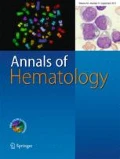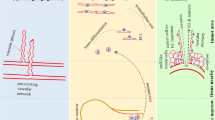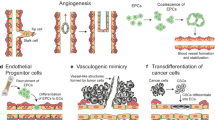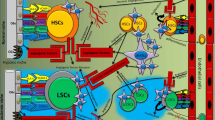Abstract.
Angiogenesis defined as the blood vessel generation from preexisting blood vessels was found to play an important role in the progression of solid tumors. In addition, bone marrow-derived endothelial precursor cells may contribute to tumor angiogenesis. Recently angiogenesis induction was described in several hematologic neoplasms as leukemia, lymphoma, myelodysplastic syndrome and multiple myeloma (MM). Clinical angiogenesis research also termed as angiodiagnosis has established the prognostic relevance of markers of angiogenesis e.g., microvessel density and circulating levels of angiogenic peptides. Development of antiangiogenic treatment for hematologic neoplasms has recently been sparked by the success of Thalidomide (Thal) which has antiangiogenic properties in MM. Antiangiogenic treatment strategies are now being tested in clinical trials on several types of hematologic neoplasms.
Similar content being viewed by others
Author information
Authors and Affiliations
Additional information
Electronic Publication
Rights and permissions
About this article
Cite this article
Moehler, T., Neben, K., Ho, A. et al. Angiogenesis in hematologic malignancies. Ann Hematol 80, 695–705 (2001). https://doi.org/10.1007/s00277-001-0398-3
Received:
Accepted:
Published:
Issue Date:
DOI: https://doi.org/10.1007/s00277-001-0398-3




